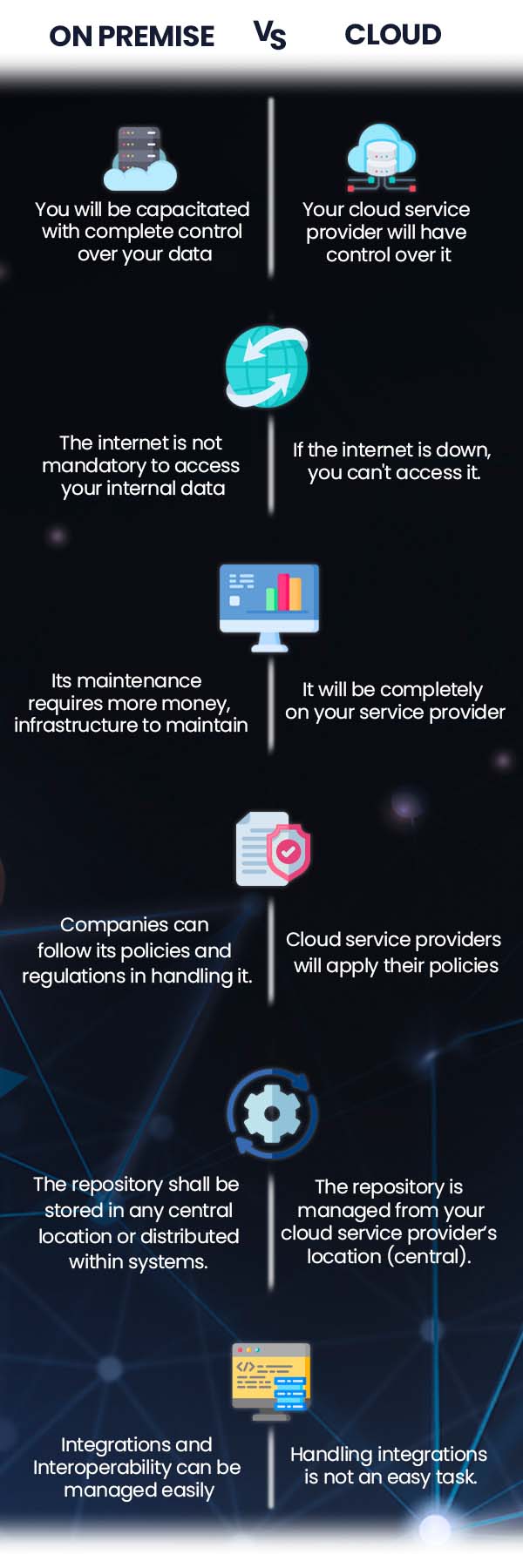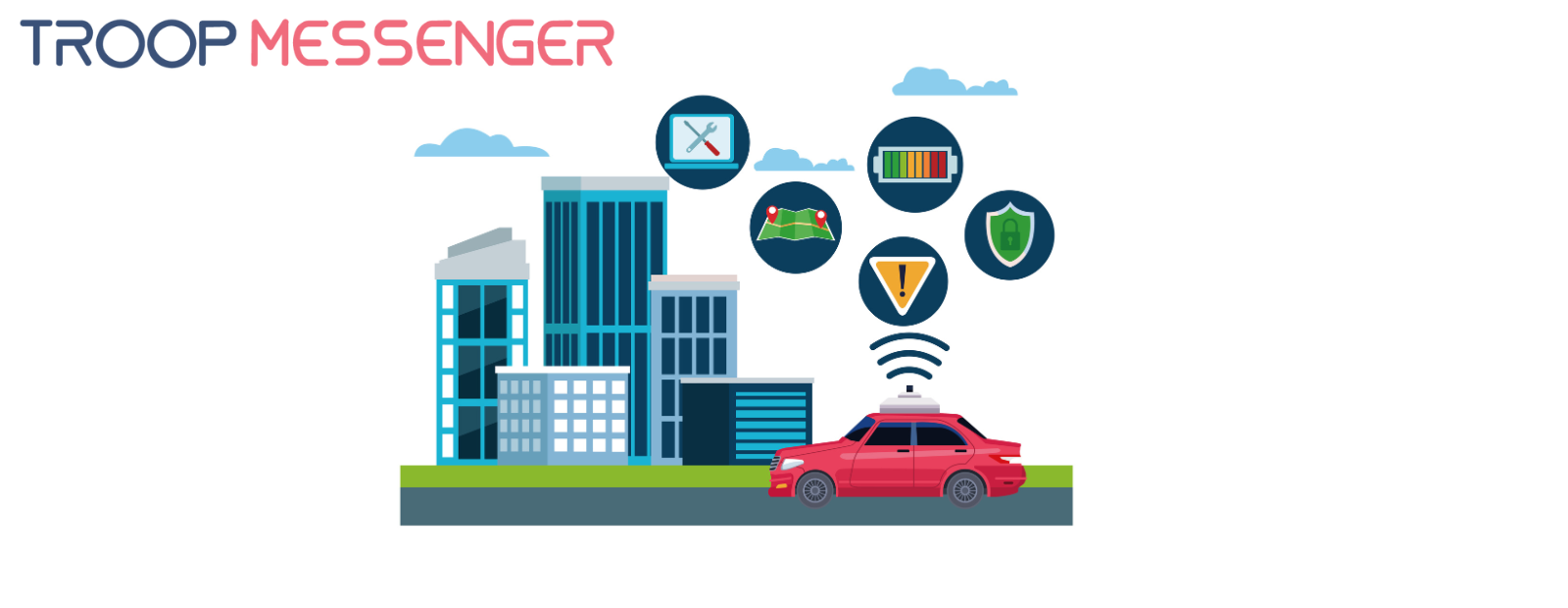Connect with us

On-Premise vs Cloud: Key Differences, Pros, and Cons
Before taking the question ‘what is on-premise?’, let's enter into the conversation from generic to specific so that nongeeks can see this blog as friendly content.
I am quite sure after learning the terms On-Premise vs Cloud or Cloud vs On-Premise, you must be reinvigorating the knowledge you have, perhaps some of you have minimum knowledge about them which is likely enough to be involved at the very start of the conversation.
If you are thinking IT companies should be worried about this topic and you ain’t since your domain differs, let me illuminate the fact that by the end of the blog, you will realize both on-premise and cloud apply to every domain.
Table of Contents
On-Premise vs Cloud - Introduction
On-Premise
What is on-premise?, it may have appeared as a simple question or you are already familiar with the on-premise meaning, well I don't blame you since the term 'on-premise' is self-explanatory isn't it, but to your information, there is more about it, it just doesn't limit to on-premise meaning, ok let me elaborate, on-premise is a method of deploying software in your premise or campus, in addition to giving you complete control over it and the data.
To use on-premise software, an organization must obtain a license or a copy of the software. Because the software is licensed and the full instance of the software is located on the grounds of an organization.
Cloud
Cloud, also known as cloud computing, is the delivery of computer services through the internet. Cloud computing is the technique of storing and accessing data from remote servers, which will be under the control of your cloud service provider.
To learn more about the cloud, you must know about different categories of cloud and cloud computing models.
Cloud Categories
Public Cloud
It is a vastly used cloud among multiple industry types. The company pays a third party to manage its data center, which is used by multiple clients, as implied. Amazon Web Services, Azure, and Google Cloud Platform are some of the most well-known public cloud providers. This is often confused with colocation data centers, where servers are not owned by the colocation facility, but instead by the business that is leasing the space.
Private Cloud
Private clouds are often run by a single user or organization, with service providers devoting their resources to a single customer and granting that organization control over server resources. The physical servers and all components are isolated by the service provider so that no other client has access to them. One of the key benefits of this cloud is that the services and security standards are updated regularly. VMware and Intranet are prime examples of private clouds. Some examples of private cloud software are data management, government fleet management software, marketing platforms, cloud security, and many more.
Note: Before opting for this category, I would suggest you go through the pros and cons between private cloud vs on-prem
Hybrid Cloud
Hybrid cloud, as the name suggests, combines public and private cloud, allowing you to use the public cloud to store data that is available to the public while using a private cloud to run your production lines and legacy applications.
According to some reports, the market for hybrid cloud integration platforms is predicted to increase by up to 14 percent compound yearly growth rate by 2023.
Types of Cloud Services
Cloud services are derived into three categories like SaaS, IaaS, and PaaS
What is SaaS (Software as a Service)?
Software as a Service, also known as SaaS, is a software licensing model in which users can obtain access to the software via subscription and the software is hosted on external servers rather than on in-house servers.
SaaS companies' products are used vastly, whose payments are made monthly, quarterly, half-yearly, yearly, or per user basis. Unlike on-premise applications, the updates will be pushed directly rather than buying it. Users can access the site or they can download it on their devices and log in with their user credentials. By logging into their account, the user can utilize the software package from their computer or device. The program is hosted on a cloud services server, where data is securely saved.
What is IaaS (Infrastructure as a Service)?
What is Infrastructure as a Service? It is a cloud-infrastructure service, which can also be referred to as On-premise IaaS that delivers virtualized computing services on the internet, such as server, network, and storage resources on-demand and on a pay-as-you-go basis, and it provides the cloud's lowest-level control. Organizations can benefit from IaaS in a variety of ways, including making workloads faster, easier, more flexible, and cost-effective.
What is PaaS (Platform as a Service)?
PaaS is a complete cloud development and deployment environment with resources that enable you to develop everything from simple cloud-based apps to sophisticated, cloud-enabled business applications. Like IaaS you shall have to purchase your required resources on a pay-as-you-go basis, in addition, you will be entitled to access it on secured internet.
What is DaaS (Desktop as a Service)?
Desktop as a Service solution, also known as DaaS, is a type of modern virtualization technology that delivers your desktop in the cloud. And it is the process of creating a software-based virtual version of things whether that be computing, storage, networking, servers, or applications that behave just like their physical desktop functionality. End-users can access their cloud desktop anywhere, anytime via a browser or any device. DaaS is considered a no-brainer solution for remote teams if you are a small or medium size company.
What are the advantages and disadvantages of on-premise vs cloud?
Start-ups and existing companies alike have a group of influentials who are constantly debating cloud vs on-premise, or whether they should go with on-premise on cloud or cloud on on-premise. Perhaps their uncertainty comes from the fact that they are unsure of on-premise cloud infrastructures' advantages and disadvantages, which would help them make an informed decision.
On-Premise
Advantages
- Without relying on a third party, you will have complete control over your data, which will most likely include client or customer data.
- Despite the lack of an internet connection, you will be able to access your internal data in your capacity.
- Because you will be solely accountable for your data, you may be more aware of the security firewalls or measures you employ, rather than relying hesitantly on the claims of your third-party service provider's security measures.
- On-premises software delegates the privileges of customizing, altering, and configuring particular data within the software to customize it to their business needs and requirements because you own the software's license and property rights.
Disadvantages
- On-premises upgrades consist of high upfront costs, which indicates that purchasing sufficient hardware can be very expensive and difficult to scale as demand develops.
- On-premise stipulates rack space or a server room/closet on your premises, along with dedicated IT support.
- Data must be backed up, and application functionality must be guaranteed. Employees are in charge of installing updates, running VMware backups among others, and keeping the apps up to date.
- On-premises entails a huge time taking process to study, justify, order, and deploy hardware, hence you'll need a well-thought-out plan in advance for any adjustments, and your IT department will have more work to do.
Cloud
Advantages
- In contrast to on-premise storage, data can be stored off-site and backed up by the cloud services provider. As a result, the cloud can offer safe off-site data storage. It is critical to create backups of your data and store them elsewhere so that they may be recovered in the event of a big disaster.
- Since your cloud storage is managed by your service provider, you don't have to delegate your IT staff to it, henceforth they don't have to focus on other tasks such as installing new software patches and updates.
- Your employees can use any computer, smartphone, or tablet, to connect from anywhere. Therefore your companies can avail themselves of the privilege of implementing policies such as Bringing your device (BYOD).
- Users can rest easy knowing that if their computer crashes or their local files are lost, they can recover their data using cloud-based services, so your company which will be in a position of minimal risk of losing essential information by having access to the critical data.
- Cloud technology offers scalability advantages that can significantly benefit businesses. With cloud services, companies can easily scale their resources up or down based on their needs, avoiding the challenges of on-premise scalability, which often involves high upfront costs and complex hardware adjustments.
Disadvantages
- Its entire performance depends on the internet connection you are using, as a result, it becomes a tedious task in accessing your information while the internet is slow, so you have to ensure that you use a flawless internet connection like Spectrum Internet service with high speed.
- If the internet goes down you wouldn't be able to access the data for cloud application modernization, unlike on-premise.
- Since you are depending on your service provider who is not a member or employee of your company, there are chances where it fell into unauthorized personnel access, so you have to verify their security practices.
- If your local law enforcement issues a search warrant to your service provider while your business is being investigated, your service provider will be forced to provide them access to your complete storage without your knowledge. And if the service provider resides in a different country then you shall be bound to abide by the particular country’s data protection laws.
What is the difference between on-premise and cloud?
To avoid confusion let us look into on-premise vs cloud, in other words, let's learn the differences.
Control
On-Premise
Enterprises retain all their data and have complete control over what happens to it in an on-premise environment. As a result, large companies or industries that require additional privacy are more likely to opt on-premise rather than depending on a third party for the cloud environment.
Cloud
Compared to on-premise dissimilarly in the cloud, the entire data and encryption keys will be attained by your third-party provider. And as aforementioned when law enforcement investigates with a search warrant they shall be obligated in sharing the access without your consent.
Deployment
On-Premise
Resources and apps are deployed in-house and within an enterprise's IT infrastructure control in an on-premises environment. The business head will be in charge of maintaining and managing the associated process. With the on-premise deployment, only organizations and authorized employees can have access.
Cloud
There are three forms of cloud computing, as indicated above: public cloud, private cloud, and hybrid cloud. Resources are deployed at the service provider's end and accessed by the public in a Public Cloud environment, conversely in a Private Cloud, resources are allocated based on the needs of the customer and are only accessible to them.
Security
On-Premise
Companies that are concerned or extra sensitive about their data, such as finance, defense, software, and so on, prefer on-premise because they are solely responsible for the security, and as a result, they don't leave any stone unturned in terms of implementing world-class security measures; in fact, some companies' security measures are far superior to some giant cloud service providers.
Cloud
The Cloud Service providers provide a secure environment. They provide a diverse range of policies and technologies that will be in charge of your data's security, yet there were some unfortunate instances in the past where intruders breached it.
Flexibility
On-Premise
The organization will cover the cost of purchasing or updating your infrastructure. In comparison to cloud software, you will be able to customize on-premise software.
Cloud
Unlike on-premises, you can quickly upgrade or modify your infrastructure to meet your needs without having to make huge expenditures on expensive hardware every time.
Cost
On-Premise
Enterprises that install software on their servers are responsible for the continuous costs of server hardware, maintenance, replacements, power usage, and the area where your architecture is developed.
Head-to-Head Comparison Between On-Premise vs Cloud (Infographics)

Which is cheaper on-premise or cloud?
When comparing the costs of on-premise vs cloud, certainly on-premise will appear to be more expensive, but you should consider why large sectors or data-sensitive organizations like the banking sector prefer on-premises. You will have the option of implementing security safeguards on your premises, rather than relying on the subpar security measures employed by cloud service providers. So, without prolonging the thoughts to go with on-premise or cloud, if you may consider, despite the former option being more expensive, you should not overlook the amount of confidence you will have in securing data on your premises.
Is cloud more reliable than on-premise?
I'll provide just one example: despite what was said above, you can still access internal data without the internet with your on-premise server being at your place, however, the cloud is fully dependent on the internet you choose, thus you can't access the data while the internet is down.
As a result, in the head-to-head battle of on-premise vs cloud, on-premise once again intimidates the cloud.
Is on-premise safer than a cloud?
In the view of on-premise vs cloud, I believe on-premises will prevail since you will have your IT personnel to look after your data and your security procedures in place, so there is no way for attackers to peek into your data.
Cloud computing, on the other hand, there has been a slew of high-profile cloud security breaches. Employees' personal information, such as login credentials, to the theft of intellectual property, are among the real-time security concerns.
Conclusion
I hope I've piqued your interest in learning more about or in the context of on-premise vs. cloud, and I'm confident you've concluded that on-premise is the more secure and trustworthy alternative.
If you want to know our stand between on-premise vs cloud, Troop Messenger strongly advocates on-premise software or on-premise chat, despite its ability to install in the form of SaaS, Chat APIs & SDKs, given the current and unfortunate future scenarios where our data is sold or exploited against us unethically by invaders.








